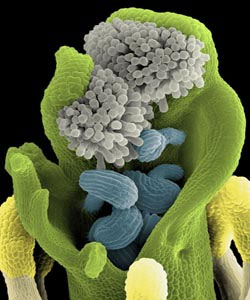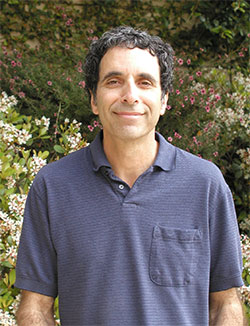Fourth Evolution Matters Lecture Unravels the Abominable Mystery of Flowers
February 26, 2008
By: Paul K. Mueller
The magical and mysterious world of flowers is the topic for the fourth lecture in the popular "Evolution Matters" lectures presented by the Division of Biological Sciences at UC San Diego.

In Arabidopsis and other flowering plants, ovules (false-colored blue in this scanning electron micrograph) are normally enclosed by tissues of the carpels (green). In this mutant, however, carpel growth is defective, leading to the exposure of the ovules.
Jose Dinneny and Martin Yanofsky
For thousands of years, people have pondered the mysteries of flower development and how these flowers ultimately give rise to fruit. Recent studies have begun to unravel these long-standing mysteries, leading to a detailed understanding of how a handful of genes interact to direct the formation of flowers and fruit. This new-found knowledge offers remarkable opportunities for increasing the yield of agriculturally important crop plants.
Martin Yanofsky, professor of biology at UC San Diego, will discuss those recent studies and more in "Unraveling the Mysteries of Flower Formation," at 6:30 p.m. on Thursday, March 6, in the San Diego Natural History Museum in Balboa Park. Free registration begins at 6 p.m. at the museum, and the public is invited to attend.
"Charles Darwin referred to the origin of flowering plants as 'an abominable mystery,' as they suddenly appeared in the fossil record more than 130 million years ago," says Yanofsky, "and this emergence has remained mysterious."
Flowers are made of four different organ types - petals, sepals, stamens and carpels. For centuries, scientists speculated that each organ represented a modified leaf, but no study had tested this hypothesis. The breakthrough in research into the underlying mechanism behind the modifications, Yanofsky said, came from an analysis of floral mutations. These studies led to the now-famous ABC model of flower development, which describes how the ABC genes control flower-organ identity.
Yanofsky helped test the model by successfully isolating the C and A genes - the first scientist to do so. "Having these genes in hand," he says, "has allowed other researchers to rapidly isolate the corresponding genes from many types of plants. It's now clear that the ABC model of flower development is generally applicable to all flowering plants."

Martin Yanofsky, professor of biology at UC San Diego, unravels the mysteries of flower formation in the fourth "Evolution Matters" lecture at 6:30 p.m. on Thursday, March 6, in the San Diego Natural History Museum in Balboa Park.
Yanofsky is internationally recognized for his research on the genetic control of flower and fruit development. A Fellow of the American Association for the Advancement of Science, he currently serves as Chair of the Section of Cell and Developmental Biology at UC San Diego.
The five "Evolution Matters" lectures are sponsored by the Division of Biological Sciences at UCSD, Amylin Pharmaceuticals and Kirin Pharma. Previous lectures included "Clockwork Genes: Biological Rhythms in Health and Agriculture," by Steve A. Kay, Dean of the Division of Biological Sciences; "Embryos and Evolution," by William J. McGinnis, professor of biology; and "The Evolution of Complexity: From the Human Brain to the Rainforest," by Christopher Wills, professor of ecology, behavior and evolution biology.
The fifth and final lecture, "The Genetics of Primate Evolution: A Rosetta Stone for Understanding Human Disease," by Ajit Varki, professor of medicine at UC San Diego, will be held at 6:30 p.m. on Thursday, April 24, in the San Diego Natural History Museum.
